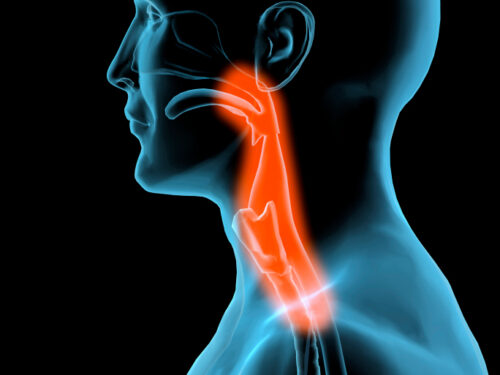Source: www.oncologynurseadvisor.com
Author: Vicki Moore, PhD
Treatment with dysphagia-optimized (DO) intensity-modulated radiotherapy (IMRT) improved patient-reported swallowing function in patients with pharyngeal cancer compared with standard IMRT. These results of a phase 3 study were published in the journal Lancet Oncology.

Dysphagia-optimized IMRT was found to reduce radiation dose to the throat structures, thereby improving dysphagia and aspiration function compared with standard IMRT. Source: Getty Image
“Our findings suggest that reducing dose to the pharyngeal constrictor muscle translates into patient benefit through improved swallowing function,” the study investigators wrote in their report.
The phase 3 DARS study (ISRCTN Registry Identifier: ISRCTN25458988) was conducted across radiotherapy centers in the UK and Ireland. Enrolled patients had biopsy-confirmed squamous cell carcinoma of the oropharynx or hypopharynx in addition to meeting certain eligibility criteria. Patients were randomly assigned 1:1 to receive either DO-IMRT or standard IMRT over 6 weeks.
The radiotherapy target dose was 65 Gy to the primary and nodal tumor, while the remaining tumor subsite and nodal regions considered at risk of occult microscopic disease had a target dose of 54 Gy. With DO-IMRT, there was a 50-Gy mean dose constraint for the superior and middle pharyngeal constrictor muscle or inferior pharyngeal constrictor muscle residing beyond the high-dose target volume. The primary endpoint of the study was the MD Anderson Dysphagia Inventory (MDADI) composite score at 12 months following treatment in the modified intention-to-treat population, which included patients completing this assessment.
In this study, 112 patients were assigned to treatment, with 56 patients in each treatment arm. The median patient age was 57 years. Patients had a median follow-up of 39.5 months in this analysis. The modified intention-to-treat population included 52 patients in the DO-IMRT arm and 45 patients in the standard IMRT arm.
Mean MDADI composite scores at 12 months were significantly higher in the DO-IMRT arm (mean score, 77.7 [SD, 16.1]) than was observed in the standard IMRT arm (mean score, 70.6 [SD, 17.3]), for a mean difference of 7.2 (95% CI, 0.4-13.9; P =.037). In an analysis adjusted for baseline and other factors, the mean difference in score was 9.8 (95% CI, 3.5-16.0; P =.0030).
No treatment-related deaths were reported in the study. Grade 3 or 4 late adverse events that were most common included hearing impairment (16% in the DO-IMRT arm and 13% in the standard IMRT arm), dry mouth (5% and 15%, respectively), and dysphagia (5% and 15%, respectively). During radiotherapy, 75% of evaluable patients in the DO-IMRT arm reported grade 3 or worse adverse events, compared with 87% in the standard IMRT arm.
The study investigators concluded that DO-IMRT associated with improved patient-reported swallowing function over standard IMRT in this study. “Further research into the effect of different dose distributions on the dysphagia and aspiration risk structure should be undertaken to identify which patients are likely to benefit most from DO-IMRT,” the study investigators wrote in their report.
Reference
Nutting C, Finneran L, Roe J, et al; DARS Trialist Group. Dysphagia-optimised intensity-modulated radiotherapy versus standard intensity-modulated radiotherapy in patients with head and neck cancer (DARS): a phase 3, multicentre, randomised, controlled trial. Lancet Oncol. Published online July 6, 2023. doi:10.1016/S1470-2045(23)00265-6
Disclosures: Some authors declared affiliations with biotech, pharmaceutical, and/or device companies. Please see the original reference for a full list of disclosures.

Leave A Comment
You must be logged in to post a comment.